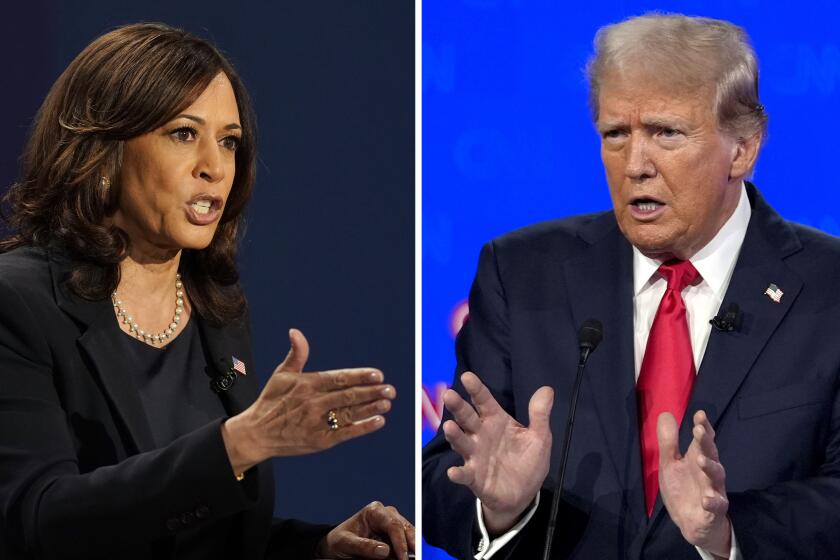Race tightening, but Obama’s still in the lead
WASHINGTON — A large drop in the nation’s jobless rate gave President Obama an unexpected boost Friday in his increasingly competitive contest with Republican challenger Mitt Romney.
The decline to 7.8% brought the unemployment rate below 8% for the first time since the first full month of Obama’s presidency and cheered the president’s partisans. Based on the reactions to past reports, it’s unlikely to change voters’ overall sense of how the country is doing economically.
Still, the announcement did have one big benefit for Obama: shifting attention away from his lackluster performance in the first presidential debate less than 36 hours earlier. The debate shook up the campaign, giving Romney new hope just when the race seemed to be quickly slipping away from him.
Combining both events — the debate and the jobs report — strategists in both parties expect to see the race tighten but also say the Democratic incumbent remains the front-runner. Obama has more options to reach the required 270 electoral votes, and Romney still faces a more difficult path.
For Romney, “it’s not as steep of an uphill fight going forward. It’s still uphill,” said Dan Schnur, a former Republican campaign consultant who directs the Jesse M. Unruh Institute of Politics at USC.
For months, Obama has benefited from a slowly recovering economy. The stock market is up and housing prices are rising. Those changes have contributed to increasing confidence about the economy and the general state of the country, according to voter polls and other measures of consumer confidence.
Now the jobs numbers have added to that picture. The Bureau of Labor Statistics reported that the U.S. economy produced a seasonally adjusted net increase of 114,000 jobs in September. In addition, the agency reported that job creation in July and August had been better than previously estimated.
Obama greeted the news by boasting that joblessness had “fallen to its lowest level since [he] took office.”
“Today, I believe that as a nation, we are moving forward again,” he said to applause from supporters at a rally in northern Virginia.
But Romney dismissed the sluggish pace of improvement, saying it is “not what a real recovery” looks like.
“We can do better,” he told an Abingdon, Va., crowd.
Romney’s partisans have been greatly encouraged by his debate performance, but the Republican faces the challenge of changing the minds of voters at a stage of the campaign when the vast majority already have their preferences firmly set.
Ohio, in particular, remains a stubborn obstacle. Romney trails by a significant margin there, though the campaigns disagree on exactly how much.
“Obama’s definitely ahead, [but] Ohio is not out of reach for Romney. He’s certainly got enough time and money to catch up,” said John Green, who directs the University of Akron’s Ray C. Bliss Institute of Applied Politics. He added that it was “entirely possible” that the latest news on jobs could cancel out some or all of Romney’s debate boost, “leaving the race where it has been.”
Without Ohio, Romney would probably need all of the remaining tossup states in order to win.
Pre-debate polls showed him gaining in Virginia and Florida, key battlegrounds where he is spending the first five days after Wednesday’s debate. He also would have to carry the swing states of Nevada, Colorado, North Carolina and Iowa (creating an unlikely 269-269 electoral-vote tie, which Romney would be favored to win in the House of Representatives).
Given Obama’s control over electoral bounties like California and New York, the president starts off with a higher number of guaranteed votes. He would need only Ohio and any one of those other six tossup states to gain reelection.
Democrats are girding for poll shifts in coming days that will show the presidential race tied nationally or Romney ahead by a point or two, though a truer test of where the race stands will be the next round of surveys in the battleground states.
Other incumbent presidents have recovered after blowing the first debate of their reelection campaigns, and Obama’s supporters are nervously watching for their man to bounce back in the second debate, on Oct. 16.
If Obama falters again, panic will probably set in. “I don’t know where we are if he has another bad debate,” said Democratic strategist Bill Carrick.
Romney’s strong showing in the first debate could help him accomplish what even his own campaign advisors said he had failed to do earlier: close the sale with voters who don’t want to give Obama another term. But with relatively few voters truly undecided, Romney also has to convert soft Obama supporters, a much tougher task.
“Go out and knock on doors and get people who voted for President Obama to see the light and come join our team,” he urged a conservative gathering in Denver on Thursday.
At the very least, the debate has squelched talk about Republican campaign money shifting to more winnable House and Senate contests.
“If Romney needs anything, he needs more time,” said Craig Robinson, a former political director of the Republican Party in Iowa, where Romney plans to campaign Tuesday. “He’s behind and he needs to catch up.”
With Nov. 6 just a month away, any day that Obama gets good headlines, as was the case Friday, hurts Romney’s efforts to gain ground. And the better economic news makes it more imperative for him to score points on other topics. On Monday, Romney will try to do just that, by delivering a major address on foreign policy, an issue that his advisors think he can turn to his advantage amid continued unrest in the Middle East.
More to Read
Get the L.A. Times Politics newsletter
Deeply reported insights into legislation, politics and policy from Sacramento, Washington and beyond. In your inbox three times per week.
You may occasionally receive promotional content from the Los Angeles Times.










